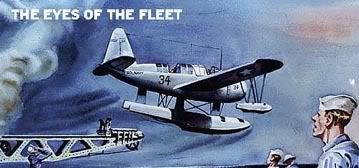ORIGINAL: Swayin
Nik,
I hear you, and in the spirit of friendly banter, have to disagree. I think he did a good job talking at length about the limitations of SC and how it wasn't the cat's meow -- and also went into detail about how much better the SG sets were, and how half the captains didn't even know what it was or how to use it properly; the fact that Callaghan kept the two ships with SG sets - the Helena and the Fletcher, IIRC - at the rear of his column where they could do no good illustrates this in my mind.
I'll keep that in mind as I continue to read. All i know is that up too and after the Savo disaster, his diserations on radar and it's relation to the battle were thin and the insertion of the ancedotal accounts suggesting that "if only" exaserbated that thinness. Its not that they were ancdeotal that made them misleading IMO, it was the context in which they were used coupled with the thin technical discussion.
I also have to disagree that so much of his points are anecdotal; by its very nature, a recount or retelling of a battle by participants in a time when there were no "black boxes" to show hard data means that eyewitness accounts have to stand for soemthing. Anecdotal evidence - like saying "my dad smoked 10 packs a day and lived until he was 99, so smoking can't really be bad for you," seems to me to be a far leap from stating something like Hornfischers's conclusions that many of the captains involved didn't know enough about how to use their radar and that the admirals leading these TFs were often blind to the data being relayed to them by their radar sets, and were incredibly slow to act on that data and relay it to the captains in the line. It's no coincidence in my mind that Ching Lee, besides being the foremost theortician on big-gun work, was also perhaps the most knowledgable surface commander afloat in terms of knowing how radar was the great game-changer ... in his words, "We realized then and it should not be forgotten now, that our entire superiority was due almost entirely to our possession of radar. Certainly we have no edge on the Japs in experience, skill, training, or performance of personnel."
Don't get me wrong. I'm not one of those, "just the [statistical] facts" persons. Statistical data is, after all the most easy to manipulate and then, because they are "data" (or more commonly called; "facts") one is told that to argue against them is to argue against the facts, not the opinion and interpretation of the poster.
When I say Hornfischer largely portrays an ancedotal account, i'm not saying he hasn't some knowledge of the basic tools used or the circumstances of battle nor am i saying that all he says is not "factual" in the context he's putting it in. I am saying that he is trying to tell a story as much, if not more so than simply relaying the facts and circumstances of the battle. His extensive use of lower level (i.e. crew) accounts that take up much of the space of the actual battle leaves one with a far different impression of these battles vs. a more dry objective reading. Certainly the details of the battle are far more sparce if the reading of Savo was any indication. I had to go back and read it twice after thinking "Thats it??!!"
I do stand by what i said earlier in that he's not a technical author. His focus tends to be more on the people and the drama surrounding them. Similar comments have been made about Ambrose of whom he could probably be best compared too. In terms of the USN's experience with radar, i suggest you do pick up Frank and read it. He makes a clear case that in mid/late 42, given the short period of time involved from peacetime to war footing, the USN commanders (flag rank) of the TF's did in fact have little understanding and even suspision of the new technology. This is a big part of why officers like Scott did not choose as flagship a vessel with the more advance SG radar. There were also issues of training and proper use of the devices. Lee was a rare exception given the time period....a flag rank officer who not only appreciated but understood the impact and value of radar and it indeed did save his bacon at the Battle of Guadalcanal. These types of "detailed" in depth discussions for both sides of the conflict are what are (so far....i'm only past Savo Island) largely missing or only rudimentarily gone over in his book. Its impossible for him to really do otherwise without the book being 3x it's current page count because so much of the book is busy relating the personal experiences of crew/soldiers who were there..and that only from the US side.
For those who want to experience the drama and passion of the war as seen from USN eyes, the book is good. However i'll have to stand by my earlier initial accessment....for those who want a more detailed, technical diseration on the tactics, technology and doctrine of the conflict (and from both sides), i'd go with Frank's book.










